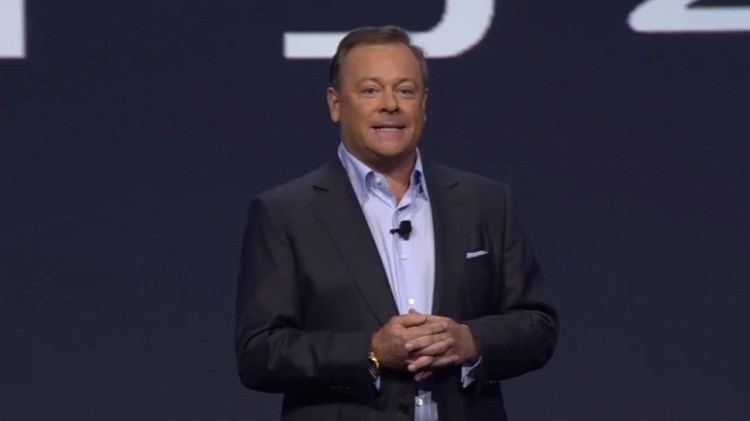testsetset
Last week, former Sony U.S. games chief Jack Tretton announced he had started a new venture capital fund, Interactive Gaming Ventures, to invest money in promising indie developers.
That means the world looks different to Tretton now. After spending 28 years — mostly at Sony’s PlayStation business — in the games business, he stepped down in 2014 as the PlayStation 4 was on its way to winning the console wars. The PlayStation was his world.
But now he can take a less partisan view of the game platforms, from Microsoft and Nintendo to relative newcomers such as Apple, Google, and Amazon. He plans to invest $1 million to $5 million in a few indie game developers per year, and he hopes that they will thrive on multiple game platforms. I talked to him about his views on these companies last week in an interview.
“I saw potential but didn’t see the passion and commitment and resolve that you need to go all in with games,” Tretton said. “With Microsoft they had growing pains, but I never questioned their commitment to games. There is never a question in my mind that Apple, Google, and Amazon could be phenomenally successful if they were committed to it. Gaming culture is very unique. If they try to run it like other parts of their business, they could struggle.”
Tretton is worried that big companies can’t take as many risks anymore on big-bet games, resulting in less creativity at the high end of games. And Tretton hopes that indies can fill the gap.
Here’s an edited transcript of our interview.

Above: Jack Tretton is managing partner of Interactive Gaming Ventures.
Jack Tretton: I got to a stage in my career, after 28 years on the corporate side—I loved my time there, but when you’re part of a big company, the positive side is you have a lot of resources and a lot of allies you work with, and the negative side is you’re an employee. You have to subscribe to every theory your company subscribes to, whether you believe it or not. I longed for an opportunity to apply what I had learned on the corporate side, but go independent and pick my partners and find those organic relationships. I wanted to work with people who saw value in what I could bring to the table.
I’ve been doing that for four years now. I’ve done a lot of work with the bigger publishers, helping them with M&A work and general industry advice, finding potential studios and projects to acquire. I’ve worked a lot with the financial analyst community, helping them with research on various companies in the industry in general. I spent a lot of time with indie developers, either through M&A situations where they were looking to raise money or sell a project or sell their studio, or just providing general introductions and management advice.
I’ve developed a passion for working with young development teams, people with a lot of talent, but who don’t have the years of experience in the industry or a lot of experience with go-to-market strategies. The great thing about the digital world and the indie space is that you can go direct to the consumer. You don’t have to worry about Wal-Mart and GameStop. You don’t need the financial infrastructure. If you build a game with good gameplay and consumer appeal, you can have some success.
One of the challenges I’ve found that they universally face is raising money. We have a $100 billion industry, but most of the venture community and the private equity guys shy away from it, especially investing in small indie projects. I formed a fund with some partners about two years ago, called Ocean IQ Gaming, and we invested in a studio up in Toronto called Blue Isle Studios. That led us to consider and get a placement agent and get bankers involved to go out to the PE and VC community and really pitch them on raising a fund.
What I realized in that experience is there’s a lot of resistance to investing in industries that they’re not in and that they don’t understand. Raising a fund of size is going to require me to spend a lot of my time on administrative functions and investor relations, and less time dealing with the investments and the studios and the games, which is really where my passion lies. We ended up with a fund that’s going to allow us to invest in two to three games a year, and not only provide financial infrastructure for them, but also really immerse ourselves in the development teams and try to give them some of the corporate relationships we may have that they lack, and some of the go-to-market strategies that they don’t have experience with.
The type of studio we’re targeting is not necessarily somebody who’s creating their first game, but somebody who has put out one, two, three projects. They’ve had commercial success. It’s financially viable. But they’re looking for that additional partnership, both financially and management-wise, to take them to the next level. We’re targeting teams that look to bring out PC projects first, in early access, and then ultimately bring them to console, and if and where it makes sense, ultimately over to mobile. But it’s going to be PC-based early access developers that will then publish digitally on console.

Above: Interactive Gaming Ventures logo
GamesBeat: Are you putting a number on the fund? Some people will say it’s a $10 million fund or whatever.
Tretton: I can give you a number, but I’m trying to avoid branding the fund. The first thing people do is say, “Yeah, right.” But the simple math is, number one, as long as they’re projects that all the partners have agreed to greenlight, we have no limit on funds. It’s just a matter of how many projects we feel are viable and that we can handle. We’re targeting two to three a year, with investments in the $1-5 million range. We’re going to do a seven-year fund. If you do the simple math on that, at the low end it would be in the $35 million range, and at the high end it could be as high as $100 million. But I’d rather talk about the scope of it than the dollars.
GamesBeat: How many partners do you have as part of the investing?
Tretton: On the management side it’s just myself and my partner Doug Kennedy. The other partners are really just investors. They’re going to provide the financial backing, and they’ll certainly be involved in the project approval process, but they won’t be involved in the day to day management and relationships with the studios.
The good news is, they’re certainly very familiar with the industry. That was one of the challenges and frustrations in going out to the financial community at large. They want to understand the game industry in 30 minutes and that’s just not possible. It helps to have people that understand publishing and how the industry works. We have a perfect marriage in that regard, with everybody involved being from the industry.
GamesBeat: What was Doug’s background again?
Tretton: Doug worked at Nvidia. That’s when I met him, about 20 years ago. Prior to that he worked on the promotional side with partners like GMR on Sony’s business, and also Microsoft’s business. He had his greatest success creating a publishing studio and marketing services firm, initially for guys that were putting stuff out on the iPhone. After starting his own studio, he worked with the guys from RedOctane on the original Guitar Hero, and worked with Harmonix on Rock Band as well. He transitioned very quickly over to the indie space and was one of the pioneers there.
His background is very much on the entrepreneurial, indie side, and of course my background is more corporate, the big publisher side. It’s a nice marriage. He knows all the guys at id@Xbox, key players in publishing at all the consoles, key players in the indie space. I have a good relationship with the senior management. We work it from both sides. It makes for a good partnership where we both bring different skill sets to the table.
He’s currently CEO of Studio Wildcard, the makers of Ark: Survival Evolved. I’ve been working with that team for three years as well, in a consulting role.
GamesBeat: Since you left Sony, what would you say has been a hit for you? Is Ark something where you can say you saw it early on and it turned into a big hit? Or are there other titles you’ve worked with?
Tretton: The things I’m most proud of, where I feel like I’ve made a significant contribution, where I certainly enjoyed great financial rewards—definitely, first and foremost is Ark. I got involved with the team just before they were going into early access. They were looking to raise development funds and get help with a go-to-market strategy. I came on board in a consulting role as the chief strategy officer. We had a great deal of success, both in raising money and ultimately selling the title. We did 13 million units, and we just took it to physical retail in August 2017. It’s done more than 1.1 million units worldwide. I helped put that organization together for them. That’s worked out very well, and it’s been a real source of pleasure for me.

